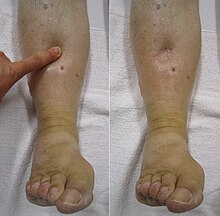Definition, Symptoms, and Diagnosis of Edema
- Edema is the accumulation of excess fluid in body tissue.
- It is also known as fluid retention, dropsy, hydropsy, and swelling.
- The most commonly affected areas are the legs or arms.
- Symptoms include tight skin, heaviness in the affected area, and joint stiffness.
- Other symptoms vary depending on the underlying cause.
- Pitting edema is characterised by indentation that persists after pressure is applied.
- Non-pitting edema does not cause indentation.
- Peripheral pitting edema is a common type caused by water retention.
- Diagnosis involves a physical examination, medical history review, blood tests, and imaging tests.
Causes of Edema
- Venous insufficiency, heart failure, and kidney problems are common causes of edema.
- Low protein levels and liver problems can also lead to edema.
- Deep vein thrombosis, infections, certain medications, and lymphedema can contribute to fluid retention.
- Fluid retention can also occur during late stages of pregnancy and in specific conditions such as inflammations, tendinitis, and pancreatitis.
- Other causes include kidney failure, liver cirrhosis, phlebetic lymphedema, late pregnancy, lack of exercise, certain medications, premenstrual water retention, lack of muscle action, varicose veins, and inflammation.
Specific Areas of Edema
- Peripheral edema is the accumulation of fluid in the lower extremities.
- Cerebral edema occurs in the brain and can be life-threatening.
- Pulmonary edema affects the lungs and can cause shortness of breath.
- Edema can occur in the cornea of the eye, leading to visual disturbances.
- Periorbital edema refers to swelling around the eyes, often seen upon waking.
Generalised Edema
- Generalised edema affects the whole body and multiple organs.
- Cardiac failure, nephrotic syndrome, liver failure, and anasarca can cause generalised edema.
- In rare cases, a parvovirus B19 infection can cause generalised edemas.
Treatment and Complications of Edema
- Treatment involves resolving the underlying cause when possible.
- Diuretics are commonly used for heart or kidney disease.
- Lifestyle changes, such as exercise, elevation of legs, and proper nutrition, can help manage edema.
- Complications of edema include skin infections or ulcers, reduced mobility, increased risk of blood clots, development of lymphedema, and organ damage or failure if underlying conditions are not effectively managed.
Edema, also spelled oedema, and also known as fluid retention, dropsy, hydropsy and swelling, is the build-up of fluid in the body's tissue. Most commonly, the legs or arms are affected. Symptoms may include skin which feels tight, the area may feel heavy, and joint stiffness. Other symptoms depend on the underlying cause.
| Edema | |
|---|---|
| Other names | Oedema, œdema, fluid retention, water retention, dropsy, hydropsy, swelling |
 | |
| "Pitting" edema | |
| Pronunciation | |
| Specialty | Cardiology, nephrology |
| Symptoms | Skin which feels tight, area may feel heavy |
| Usual onset | Sudden or gradual |
| Types | Generalised, localised |
| Causes | Venous insufficiency, heart failure, kidney problems, low protein levels, liver problems, deep vein thrombosis, lymphedema |
| Diagnostic method | Based on a physical exam |
| Treatment | Based on cause |
Causes may include venous insufficiency, heart failure, kidney problems, low protein levels, liver problems, deep vein thrombosis, infections, angioedema, certain medications, and lymphedema. It may also occur in immobile patients (stroke, spinal cord injury, aging), or with temporary immobility such as prolonged sitting or standing, and during menstruation or pregnancy. The condition is more concerning if it starts suddenly, or pain or shortness of breath is present.
Treatment depends on the underlying cause. If the underlying mechanism involves sodium retention, decreased salt intake and a diuretic may be used. Elevating the legs and support stockings may be useful for edema of the legs. Older people are more commonly affected. The word is from the Greek οἴδημα oídēma meaning 'swelling'.